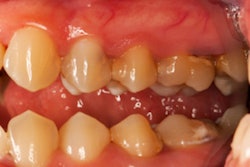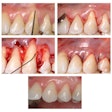
A Case Western Reserve University study may have found a new treatment option for people suffering from rheumatoid arthritis: periodontal therapy.
People who suffer from both gum disease and rheumatoid arthritis (RA) reduced their arthritic pain, number of swollen joints, and the degree of morning stiffness with nonsurgical periodontal therapy, according to the study findings (Journal of Periodontology, April 2009, Vol. 80:4, pp. 535-540).
“Physicians, dentists, and periodontologists need to be working in collaboration for the global health of our patients.”
— Ted Mikuls, M.D.
"It was exciting to find that if we eliminated the infection and inflammation in the gums, then patients with a severe kind of active rheumatoid arthritis reported improvement in the signs and symptoms of that disease," said lead author Nabil Bissada, D.D.S., chairman of the department of periodontics at Case Western Reserve University. "It gives us a new intervention."
This is not the first time that Dr. Bissada and his colleagues have found a link between gum disease and RA. A previous study by the same school found that control of periodontal infection and gingival inflammation by scaling/root planing and plaque control in subjects with periodontal disease could reduce the severity of RA (Journal of Clinical Rheumatology, June 2007, Vol. 13:3, pp. 134-137).
Periodontitis and RA share similar clinical and pathogenic characteristics, wrote Dr. Bissada and his colleagues in their latest study. Both diseases are characterized by the local destruction of hard and soft tissues as a consequence of inflammation.
New medications
The researchers looked at 40 subjects from the rheumatology division at University Hospitals of Cleveland. All the patients had moderate to severe RA and severe periodontitis. Researchers collected data about the subjects' age, gender, medical history, and medications. Periodontal and RA status as well as serum tumor necrosis factor-alpha (TNF-α) level were assessed at baseline and six weeks. TNF-α is a marker in the blood when inflammation is present in the body. It can initiate new infections or aggravate sites where inflammation already exists.
Half of the patients were given a new group of drugs that block the production of TNF-α at inflamed rheumatoid arthritis sites, while the other half were not.
The researchers divided the patients into four groups with 10 subjects each. One group consisted of patients who were on anti-TNF-α drugs and received periodontal therapy, while another group on anti-TNF-α drugs did not receive periodontal treatment. Of the two groups who were not receiving anti-TNF-α drugs, one was given periodontal therapy and the other was not.
The treatment was a standard, nonsurgical form of periodontal therapy, with scaling/root planing and oral hygiene instructions.
After receiving treatment for gum disease, improvement in RA symptoms was seen in patients who did and did not receive the anti-TNF-α medications. Of these two groups, patients on the TNF-α inhibitors showed even greater improvements over those not receiving the drugs.
The researchers found no statistically significant improvement in patients who did not receive periodontal treatment.
"Our study indicates that improvement of periodontitis helps the management of rheumatoid arthritis," said study author Ali Askari, M.D., chief of the division of rheumatology at University Hospitals of Cleveland. "This improvement is irrespective of the concomitant treatment -- be it the more contemporary treatment with biologic agents or more conventional treatment with other disease-modifying antirheumatic drugs."
Control of periodontal infection and inflammation by means of scaling and root planing and oral hygiene in subjects with moderate to severe periodontal disease might contribute to reducing the signs and symptoms of active RA, the authors concluded.
"This study is further evidence that these conditions are closely linked and, in addition to similarities in diseases pathogenesis, may also share common therapies," said Ted Mikuls, M.D., director of the University of Nebraska Medical Center College of Medicine, who has published research on this subject as well.
Anti-TNF-α effects
The authors also assessed the effect of anti-TNF-α medications on periodontitis and noted that the therapy resulted in a significant improvement in clinical attachment level, probing depth, bleeding on probing, and gingival index. However, anti-TNF-α use without periodontal treatment had no significant effect on periodontal condition.
This is one of the most significant findings of the study, according to Dr. Bissada. It means that these drugs may also be useful in treating periodontal disease.
The effects of chronic inflammation and infection of the gums are not confined to the mouth, Dr. Bissada added. Periodontal inflammation can also be a risk factor for patients who are susceptible to disease such as RA, diabetes, and heart disease.
In fact, it's becoming increasingly clear that systemic disease can have detrimental impact on dental health and poor dental health appears to have poor consequences for overall health -- including evidence linking periodontal disease to cardiovascular diseases, osteoporosis, RA, and others, Dr. Mikuls added.
"Clearly, a case can be made that physicians, dentists, and periodontologists need to be working in collaboration for the global health of our patients," he concluded.
Copyright © 2009 DrBicuspid.com



















